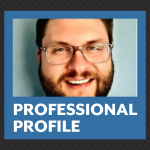Senior Editorial Operations Manager, Society of Petroleum Engineers (SPE)
 |
Please tell us a bit about yourself (e.g. hometown, current locale, course of study).
I grew up in Redlands, California. My interest in publishing came from serving on my high school and college yearbook staff. I graduated from California Baptist University with a B.A. in English Literature. After college, I attended the Denver Publishing Institute. I currently live in Boise, Idaho, and work fully remote.
Describe some of your current responsibilities and what type of organization you belong to.
I am the Senior Editorial Operations Manager at the Society of Petroleum Engineers (SPE). I manage peer-review and production for our peer-reviewed journals (~400 papers annually) and our conference papers (~5000 papers annually) with a staff of 4 people.
What does a typical day in your current role look like?
I spend a lot of time answering emails, solving problems for our authors, reviewers, and editors, as well as my staff. I support peer review and production tasks as needed to keep things moving ahead at a smooth pace. I also work closely with leadership to craft plans and policies based on my editors’ requests. I generally have 1–2 meetings on Teams a day, but the majority of my day is quiet and focused. I find the solitude energizing as I am introverted, but I can understand how this job would drive some people crazy! I travel 2–3 times a year to meet my staff in person and attend SPE and industry conferences.
What was your first scholarly publishing role? How did you get that job? What path led to your current position?
After completing the Denver Publishing Institute (DPI), I assumed I would need to move to the East Coast to get a publishing job; I was lucky enough to land an editorial assistant position at the Geological Society of America (GSA). I know the department had hired past DPI graduates, so I think that helped. I also aced the editing test. After working at GSA for eight years, eventually serving as a managing editor for their flagship journal, I left publishing to pursue my dream of owning my own craft coffee roasting company. My wife and I built that company from a small booth at our local farmers market to one of the main coffee providers for our area, complete with our own branded coffee bar. While I loved the coffee business, the financial and physical strain of small business ownership on my family was too much, and I went back to my first love. I believe my small business background, along with my foundation in scholarly publishing, helped me to land my job at SPE. I started as the Editorial and Production Manager for journals, and last year, my role was expanded to include conference papers.
If there was a pivotal moment or key person in your career development, please describe briefly.
I’d like to share about a few influential people in my career. The first was my high school yearbook instructor. Under her direction, I learned about deadlines (emphasis on “dead”) and giving your all to produce an excellent product. I went to a small private school, but our yearbook won multiple national awards for excellence, largely due to the direction of our talented instructor.
Second, my first boss at GSA taught me how to relax and focus on what matters. She always told us editors, “No one is dying on the table,” to remind us that while our work was important, it was not worth the level of stressful attention we were giving it. This helped me to look past the day-to-day grind and focus on the big picture, which has been so important for leadership.
What are some of the surprises/obstacles that you’ve encountered during your career?
I learned rather early in my career that I was not a very detail-oriented editor. While I can do it, I have learned to rely on my talented staff, who can get into the minutia and stay focused with extremely technical publications. I’ve been able to focus on my strengths, which are building efficient systems and planning for future innovations.
What do you wish you knew more about?
I wish scholarly publishing were more highlighted as a potential career path. In my English department, publishing was just a vague idea, and at the Denver Publishing Institute, the focus was on commercial/trade publishing. While the high-risk, high-reward world of commercial publishing is a great fit for many publishing professionals, it was not for me. Scholarly publishing offers a stable industry that supports research across the globe. It is a great community, and I am always encouraging those I meet who are majoring in English or a related field to consider scholarly publishing.
What advice would you give to people interested in a career in scholarly communications?
Spend time in a working publication office to make sure you like the environment. It is not for everyone. If you are in college, consider joining the yearbook, newspaper, or magazine staff. Look at internships or even entry-level positions if you have a college degree.

